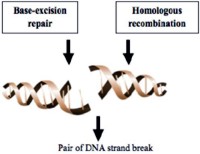PARP-Inhibitors in BRCA-Associated Pancreatic Cancer
Abstract
Recent data suggests that treatingpatients with pancreatic cancer that express mutations in BRCA1, BRCA2, and PALB2 with chemotherapy which targets the DNA repair defect in these cells, such as platinum based therapies or PARPi [poly (ADP-ribose) polymerase inhibitor], may be more beneficial in these patients. Moreover, further data also indicates the promise of combining PARPi with conventional chemotherapy. Authors summarize the data related to PARPi in BRCA-associated pancreatic cancer that was presented at the annual meeting of ASCO 2014. Enrolment on a clinical trial for patients who fit these criteria should be encouraged.
Image: Schematic representation of PARP and BRCA mediated DNA repair.
Downloads
References
American Cancer Society. Cancer Facts & Figures 2014. Atlanta: American Cancer Society. 2014.
Lowery MA, Kelsen DP, Stadler ZK, Yu KH, Janjigian YY, Ludwig E, D'Adamo DR, et al. An emerging entity: pancreatic adenocarcinoma associated with a known BRCA mutation: clinical descriptors, treatment implications, and future directions. Oncologist. 2011; 16(10):1397-402. [PMID:21934105]
Klein AP. Genetic susceptibility to pancreatic cancer. Mol Carcinog. 2012; 51(1):14-24. [PMID: 22162228]
Lucas AL, Shakya R, Lipsyc MD, Mitchel EB, Kumar S, Hwang C, Deng L, et al. High prevalence of BRCA1 and BRCA2 germline mutations with loss ofheterozygosity in a series of resected pancreatic adenocarcinoma and other neoplastic lesions. Clin Cancer Res. 2013; 19(13):3396-403 [PMID:23658460]
The Breast Cancer Linkage Consortium. Cancer Risks in BRCA2 Mutation Carriers. J Natl Cancer Inst. 1999; 91(15):1310-6. [PMID:10433620].
Thompson D, Easton DF. Cancer Incidence in BRCA1 mutation carriers. J Natl Cancer Inst. 2002; 94(18):1358-65. [PMID:12237281]
Iqbal J, Ragone A, Lubinski J, Lynch HT, Moller P, Ghadirian P, Foulkes WD, et al. The incidence of pancreatic cancer in BRCA1 and BRCA2 mutation carriers. Br J Cancer. 2012; 107(12):2005-9. [PMID:23099806]
Carden CP, Yap TA, Kaye SB. PARP inhibition: targeting the Achilles’ heel of DNA repair to treat germline and sporadic ovarian cancers. Curr Opin Oncol. 2010; 22(5):473-80. [PMID:20485165]
Plummer ER, Calvert H. Targeting poly (ADP-ribose) polymerase: a two armed strategy for cancer therapy. Clin Cancer Res. 2007; 13(21):6252-6. [PMID:17975135]
Rouleau M, Patel A, Hendzel MJ, Kaufmann SH, Poirier GG. PARP inhibition: PARP1 and beyond. Nat Rev Cancer. 2010;10(4):293-301. [PMID:20200537]
Comen EA, Robson M. Inhibition of poly(ADP)-ribose polymerase as a therapeutic strategy for breast cancer. Oncology (Williston Park). 2010; 24(1):55-62. [PMID:20187322]
Yuan Y, Liao YM, Hsueh CT, Mirshahidi HR. Novel targeted therapeutics: inhibitors of MDM2, ALK and PARP. J Hematol Oncol. 2011; 4:16. [PMID:21504625]
Jacob DA, Bahra M, Langrehr JM, Boas-Knoop S, Stefaniak R, Davis J, Schumacher G, et al. Combination therapy of poly (ADP-ribose) polymerase inhibitor 3-aminobenzamide and gemcitabine shows strong antitumor activity in pancreatic cancer cells. J Gastroenterol Hepatol. 2007; 22(5):738-48. [PMID:17444865]
Chen S, Wang G, Niu X, Zhao J, Tan W, Wang H, Zhao L, et al. Combination of AZD2281 (Olaparib) and GX15-070 (Obatoclax) results in synergistic antitumor activities in preclinical models of pancreatic cancer. Cancer Lett. 2014; 348(1-2):20-8. [PMID:24534203]
Yuan K, Sun Y, Zhou T, McDonald J, Chen Y. PARP-1 regulates resistance of pancreatic cancer to TRAIL therapy. Clin Cancer Res. 2013; 19(17):4750-9. [PMID:23833311]
Porcelli L, Quatrale AE, Mantuano P, Leo MG, Silvestris N, Rolland JF, Carioggia E, et al. Optimize radiochemotherapy in pancreatic cancer: PARP inhibitors a new therapeutic opportunity. Mol Oncol. 2013; 7(3):308-22. [PMID:23148997]
Lowery MA, Kelsen DP, Stadler ZK, Yu KH, Janjigian YY, Ludwig E, D'Adamo DR, et al. An emerging entity: pancreatic adenocarcinoma associated with a known BRCA mutation: clinical descriptors, treatment implications, and future directions. Oncologist. 2011; 16(10):1397-402. [PMID:21934105]
Fogelman DR, Wolff RA, Kopetz S, Javle M, Bradley C, Mok I, Cabanillas F, et al. Evidence for the efficacy of Iniparib, a PARP-1 inhibitor, in BRCA2-associated pancreatic cancer. Anticancer Res. 2011; 31(4):1417-20. [PMID: 21508395]
Kaufman B, Shapira-Frommer R, Schmutzler RK, Audeh MW et al. Olaparibmonotherapy in patients with advanced cancer and a germline BRCA1/2 mutation: An open-label phase II study. J Clin Oncol. 31, 2013; (ASCO 2013 suppl; abstr 11024).
Pishvaian MJ, Wang H, Zhuang T, He AR et al. A phase I/II study of ABT-888 in combination with 5-fluorouracil (5-FU) and oxaliplatin (Ox) in patients with metastatic pancreatic cancer (MPC). J Clin Oncol. 31, 2013; (suppl 4; abstr 147).
O'Reilly EM, Lowery MA, Segal MF, Smith SC et al. Phase IB trial of cisplatin (C), gemcitabine (G), and veliparib (V) in patients with known or potential BRCA or PALB2-mutated pancreas adenocarcinoma (PC). J Clin Oncol. 32:5s, 2014; (suppl; abstr 4023).
Domchek S, McWilliams RR, Hendifar AE, Shroff RA. A phase 2, open-label study of rucaparib in patients with pancreatic cancer and a known deleterious BRCA mutation. J Clin Oncol. 32:5s, 2014; (suppl; abstr TPS4161).
Lowery MA, Lee A, Tobias E, Sung P et al. Evaluation of PARP inhibition as a platinum sparing strategy in Brca2-deficient pancreatic tumors. J Clin Oncol. 32, 2014; (suppl; abstr e15237).
Klauschen F, von Winterfeld M, Stenzinger A, Sinn BV, Budczies J, Kamphues C, Bahra M, et al. High nuclear poly-(ADP-ribose)-polymerase expression is prognostic of improved survival in pancreatic cancer. Histopathology. 2012; 61(3):409-16. [PMID:22384823]

Copyright (c) 2014 Anshul Bhalla, Muhammad Wasif Saif

This work is licensed under a Creative Commons Attribution 4.0 International License.
As a member of Publisher International Linking Association, PILA, iMedPub Group’s JOP follows the Creative Commons Attribution License and Scholars Open Access publishing policies. Journal of the Pancreas is the Council Contributor Member of Council of Science Editors (CSE) and following the CSE slogan Education, Ethics, and Evidence for Editors.